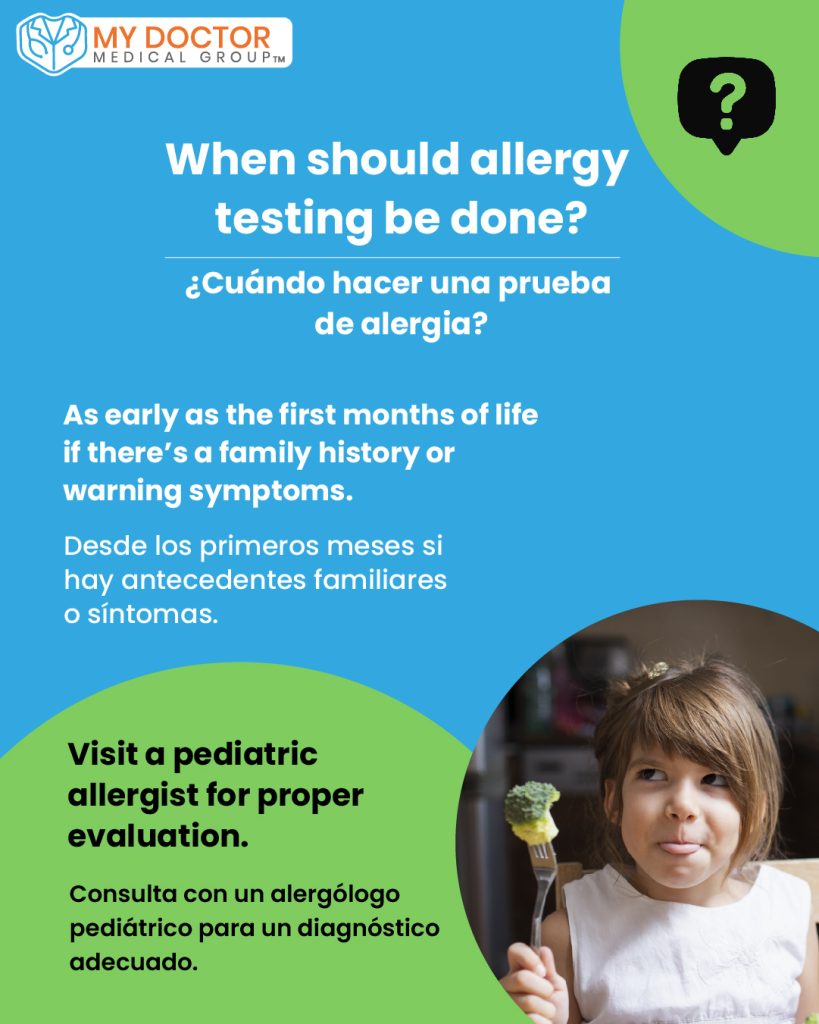World Allergy Week, organized by the World Allergy Organization (WAO), will take place from June 29 to July 5, 2025. Its aim is to raise global awareness about allergic diseases, improve diagnosis, and promote prevention and management strategies.
This Year’s Focus: Childhood Food Allergies
The 2025 theme focuses on childhood food allergies, aiming to educate families, schools, and communities about prevention, safe eating practices, and the importance of early recognition of anaphylaxis.
Why Childhood Food Allergies Matter
- Their incidence is increasing globally.
- Young children may suffer severe reactions, including anaphylaxis.
- Educating caregivers and school staff allows for quick recognition and timely treatment.
How can I know if my child has a food allergy?
Identifying whether a child has an allergy can be challenging, as symptoms range from mild to severe. Some signs include skin rashes, vomiting, diarrhea, difficulty breathing, swelling of the lips or tongue, and in severe cases, anaphylaxis.
To confirm an allergy, it is recommended to visit a pediatric allergist. Diagnosis may include:
- Detailed medical history of the child and symptoms.
- Skin prick tests.
- Blood tests to detect specific IgE antibodies.
- Elimination diet under professional supervision.
Understanding Anaphylaxis | World Allergy Week
Anaphylaxis is a serious and potentially life-threatening allergic reaction that can occur within minutes of exposure to an allergen. The most frequent triggers include:
- Foods: cow’s milk, eggs, peanuts, tree nuts (such as walnuts, almonds), wheat, soy, fish, and shellfish.
- Medications: antibiotics like penicillin, nonsteroidal anti-inflammatory drugs like ibuprofen, and certain anesthetics.
- Insect stings: bees, wasps, and hornets.
Common symptoms include difficulty breathing, throat swelling, hives, drop in blood pressure, and loss of consciousness.
Immediate treatment is crucial: administering epinephrine via an auto-injector can save lives. For this reason, parents, caregivers, and educators must be prepared to act quickly.

How can parents prevent these reactions?
- Read labels carefully on all foods and products.
- Avoid processed foods if contents are uncertain.
- Clearly communicate allergies to schools and social environments.
- Always carry an epinephrine auto-injector and ensure both child and responsible adults know how to use it.
- Consult with a pediatric allergist to create a personalized action plan.
At what age should allergy testing be done?
Allergy testing can be done from the first few months of life if there is a family history or suspicious symptoms. According to the American Academy of Pediatrics (AAP) and the American Academy of Allergy, Asthma & Immunology (AAAAI), children at high risk may benefit from early diagnosis.
Healthcare professionals can determine the best time for testing based on the child’s history and symptoms. Early detection can help prevent severe reactions and improve the child’s and family’s quality of life.
At our clinic, we promote health through reliable and useful information. If you want to learn more about us, we invite you to visit us here: About Us.
Sources
- World Allergy Organization (WAO)
- Medical information on anaphylaxis: Mayo Clinic, NIH, Food Allergy Research & Education (FARE)
